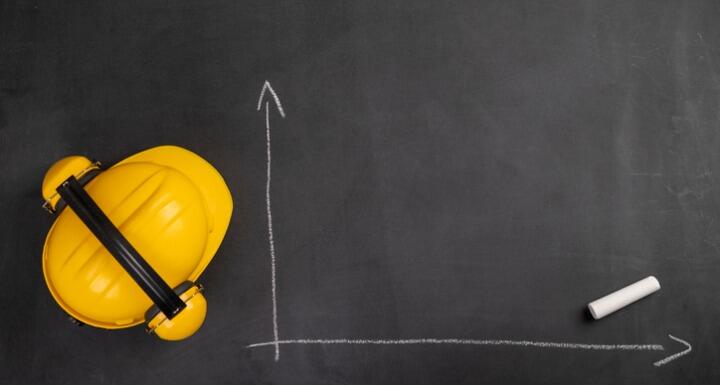On October 8, 2020, Hank Harris, the director of Ward and Smith Business Consulting and a senior chairman at FMI Corporation, delivered the keynote address at Ward and Smith's 2020 Virtual Construction Conference.
Harris, an industry veteran with over 30 years of experience in construction consulting, addressed the current economic state of the construction industry, forecasted the economic scenarios that construction companies might face over the next year or two, and offered advice on how companies can respond to the changing economic realities.
The Current Economic Outlook
With respect to the current state of the construction industry in 2020 and the COVID-19 pandemic's impact, Harris notes that the pandemic has induced a recession that is likely to wipe out economic gains made by construction companies in 2018 and 2019 and to stagnate short-term economic growth. Thus, most companies should expect growth for 2020 to be flat. At the moment, most companies Harris works with have healthy balance sheets as a result of several strong years and do not have large concerns about the near term because of strong backlogs. Harris warns, however, that the construction industry will be impacted by the pandemic, even if those impacts aren't felt right away. Therefore, it is a good idea for companies to start thinking beyond the short term.
Economic Scenarios for 2021 and Beyond
Looking ahead to 2021, Harris advises construction companies to watch for some different scenarios in the next few months. How the economy will fare in 2021 and beyond will depend on COVID research, medical advancements, political outcomes, actions by the Federal Reserve, and other factors. Ultimately, Harris forecasts that growth is likely to remain flat in 2021 and that the real challenge for the industry will come in 2022 because the construction industry tails the overall economy by 12-18 months.
According to Harris, the best-case scenario for the industry in 2021 would be that researchers develop an effective COVID-19 vaccine, people begin moving about and living more normally, and Congress passes an infrastructure spending bill. Under this scenario, some forecasters believe the economy could recovery fairly quickly.
However, many economists are considering the possibility of a K-shaped recovery. In a K-shaped recovery, the economy splits into two broad sectors; one recovers quickly, while the other continues to struggle. In this scenario, workers with more education and industries that are more resilient recover more quickly, but workers and companies in more vulnerable sectors, such as restaurants and hotels, continue to suffer.
Looking ahead, Harris does not expect that the Federal Reserve will be able to do much to stimulate the economy because it has already kept interest rates low and its ability to stimulate the economy through rate cuts is limited. That makes inflation — such as already is being experienced in lumber prices — a bigger threat, and something for construction companies to keep a close eye on.
Ultimately, even in the best-case scenario, Harris advises that "there will be some kind of recession in the industry within the next 18 months or so.” Thus, it is important that those in the industry begin to think about how to best manage their businesses during this expected recession.
Responding to Economic Uncertainty
All businesses face what Harris calls the paradox of management. The paradox is this: the future is uncertain, but all the information that leaders have for planning the future is from the past. Because of this paradox, no plan is perfect, but the process of planning is still valuable. For his part, Harris is helping the companies he works with to prepare and plan for multiple scenarios — a best case, worst case, and most likely case. For each scenario, the company decides on indicators to monitor, so they know which way the market is actually trending, and what actions to take based on those indicators.
Harris outlined four critical areas those in the construction industry should think about in planning and preparation for the future: strengthening balance sheets, controlling costs, making good decisions, and leadership.
A. Boosting balance sheets
Some companies have enough capital that they find M&A opportunities during a slower economy — if their balance sheets are strong enough. Most construction firms, however, are focused on shoring up their balance sheets and preparing for tougher economic times. Harris estimates that many companies will be working to preserve cash and exploring their available credit.
While construction firms typically have lines of credit, Harris warns that there is a risk they won’t be available when contractors actually need them — when the work slows down. One solution Harris proposes is the use of long-term debt: “I think a lot of companies ought to be looking at long-term debt. Long-term debt is cheap. You put dry powder on your balance sheet. . . . It’s a smart thing to be thinking about those kinds of things right now.” According to Harris, long-term debt allows companies to add cash to their balance sheet and reduce the pressure on their working capital, while also keeping the current liabilities lower. Thus, it may be worthwhile to consider long-term debt as a financing option during the expected recession.
B. Controlling costs
Cutting costs and tightening up control overspending is one of the first things companies do when the economy turns down. As Harris explained, “I don’t know anybody that can’t get 10% out of their overhead and not think too hard about it. But, if you’ve got to go beyond that 10% it starts to get hard.”
Harris urges executives to think about cost-cutting both broadly and “surgically.” As an example, Harris cited a large construction company in Miami that during the Great Recession cut all of its courier fees — UPS, FedEx, and so forth. Such surgical cost cuts can be symbolic — sending a message to everyone in the company to be careful about spending.
One tough, but often necessary area of cost-cutting, is people. Most of a construction company’s costs are in people. Harris noted that there is often a debate about whether it makes more sense to cut everyone’s pay or to lay people off. The answer to that question may depend on your views about meritocracy and what Harris describes as the “normal distribution of talent.” According to Harris, "every organization has a normal distribution of talent. What that means is you’ve got 10 to 20% on the tail end of that distribution that really just aren't that good.” In other words, Harris implies that cutting your least productive workers can be an effective cost-cutting mechanism.
C. Decision making
Economic uncertainty creates risk, and in the construction industry, a big source of risk comes from the projects that companies bid on. A good project will be profitable. As projects dry up, however, competition increases, bids go down, and the risk of unprofitable projects go up. Harris advises that risk avoidance is important during an economic downturn because "many contractors don’t need to make a lot of money in a really bad market, they just need to stay in the black. If they at least stay in the black, they’re always the companies that will kill it when the market turns around.”
To reduce project-related risks, Harris encourages the use of what he calls the five “circles of risk,” an idea he got from another construction executive with who he sat on a corporate board with. The five circles of risk are:
- Do you have the team for the project?
- Has your company worked on this type of project before?
- Have you worked with this client before? If not, have you done your due diligence on the client?
- What kind of risk is in the contract? Based on the negotiation process, is the client the kind of project owner that will play fair and be reasonable?
- Have you done work in this geographic area before? If not, there might be risks you don’t understand.
If more than one of the "circles of risk" are present on a prospective project, then your company probably shouldn't pursue that project in the midst of an economic downturn.
D. Leadership
Finally, Harris notes that strong, skilled leadership is essential to getting a company through difficult times. As Harris puts it, "anybody can steer the boat when things are going well, but steering the boat when things are not going well, that’s when real leadership is required.”
Harris emphasizes that the key to strong leadership is consistent, clear communication from the top. When the pandemic arose in the spring, the CEOs of the companies Harris works with jumped out front and took over nearly all of the communication — intent on not allowing their message to get garbled through layers of management. Leaders need to figure out how they’re going to ramp up their communications with employees when the environment becomes challenging. This might mean visiting job sites more often, recording frequent video messages that people can play on their phones, or something else. In Harris' eyes, "real leadership is your ability to communicate effectively with your people in whatever manner that takes.” During an economic downturn, effective communication from leadership is more critical than ever.
In conclusion, Harris forecasts that the pandemic will have a recessionary impact on the construction industry that will be felt most strongly in 2022. In order to steer your company through any recession that the industry ultimately experiences, Harris advises that company leaders strategically plan for multiple economic scenarios, consider long-term debt as a mechanism to boost your balance sheets, find ways to cut costs, reduce risks by making thoughtful business decisions, and clearly communicate your strategies to your employees. As noted by Harris, the companies that carefully navigate the forecasted economic downturn will be well-positioned to capitalize when the market turns around. If your company would like the advice of an experienced consultant in facing these challenges, Hank Harris and the Ward and Smith Business Consulting team would be honored to assist.
This article is part of a series summarizing Ward and Smith's 2020 Construction Conference. Read the other article:








